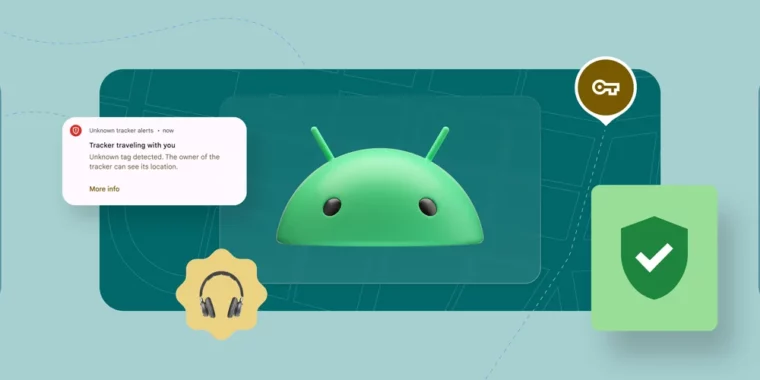
After the release of Apple’s AirTags, Google has suddenly taken an interest in the Bluetooth tracker market. The company has already quietly rolled out what should be the world’s largest Bluetooth tracking network across Android’s 3 billion active devices, and now trackers are starting to plug into that network. Google is following the ecosystem approach, letting several companies hook up to the Android Bluetooth tracking network, which has the very derivative name of “Find My Device”.
While these Bluetooth trackers are great for finding your lost car keys on a cluttered desk, they can also work as global GPS trackers, locating items much further away even though they don’t have GPS. The IDs of Bluetooth devices are public, so Tile started this whole idea of crowdsourced Bluetooth tracker location called the “Tile Network”. Any phone with the Tile app installed will scan Bluetooth devices in the background and, using the phone’s GPS, upload their last seen location to the cloud. This location information is only available to the owner of the Tile, but each Tile user scans the environment and uploads all Tiles that the app can see.
Tile is a pretty popular product, but it’s nothing like the scale of our favorite smartphone duopoly, Apple and Google. Apple rocked the market when it released AirTags and rolled out a Bluetooth tracking network to most of the 1.8 billion Apple devices out there. While Tile could work reliably in crowded places like airports, you’ll likely never be more than a few hundred feet from an iPhone, making for a much more viable global tracking network.
As usual, Google wants to do something similar, and in December 2022, Google brought crowdsourced locations to Android’s “Find My Device” network. Previously, only you recorded the last known location of your devices, but with this update, anyone’s phone should be able to upload the location of your devices. Android is terrible at sending out OS updates, but this wasn’t an OS update; it arrived through Google Play Services, which is just an app coming in through the Play Store. This meant that overnight 3 billion active Android phones received the crowdsourced tracking network update. The only problem is that it only tracked Android phones, not Bluetooth tags.
-
Chipolo’s card and tag trackers.
Chipolo
-
Pebblebee’s trackers, all of which are rechargeable.
Pebble
-
The installation should be simple for the Chipolo products. Google’s “Fast Pair” feature will display setup instructions on your phone once you turn on the trackers.
Chipolo
Now third-party Bluetooth trackers for the Android network are starting to arrive. The two companies that have announced products are Chipolo and Pebblebee, both of which appear to be clones of the Tile product line. Both offer normal keychain tracker tags and slim credit card sized trackers. Tile’s worst habits are making products completely disposable because the batteries can’t be replaced, but it seems our clones have largely avoided that. All of Pebblebee’s Find My Device products are rechargeable, which is great, while the Chipolo keychain tracker has a replaceable CR2032 battery. Only the Chipolo wallet tracker is disposable (boo!).
All of these tags will show up in the Find My Device app, right next to your Android phones, headphones, and anything else you have connected to the network. They also have a speakerphone, as usual, so you can ring them when you’re around. Both sets of products can now be reserved.
Both companies support the Google and Apple networks, but have to make separate versions of the same product for each network, which is ridiculous. Chipolo is really clunky and has three sets of products: one that works with the company’s internal apps, one that works with Apple’s Find My Network, and one that works with Google’s Find My Device Network. Can we really not consolidate this? Both Google and Apple have joined forces to combat malicious use of these tracking devices with a common standard. Can’t they just unify hardware support as well? It’s just Bluetooth!
Tile, which is being eaten alive by Big Tech, isn’t yet connected to any of these networks, but Google’s blog post says Tile will eventually join Find My Device. Google is also said to be planning its own Bluetooth tracker in the future.

